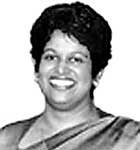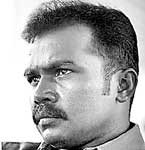
Britain unimpressed with government explanation on Karuna passportBritain has dismissed Sri Lanka’s explanation that it had no hand in granting a diplomatic passport to Vinayagamoorthy Muralitharan, popularly known as Col. Karuna Amman on which he travelled to Britain arriving at Heathrow airport on September 18. Britain is still contemplating the next steps in the light of the Sri Lanka Government’s denial and its own deep scepticism over the explanation. British authorities have accumulated sufficient evidence to conclude that the Sri Lanka Government was complicit in arranging for Karuna to obtain a diplomatic passport and thus avoid the rigorous visa procedure at the British High Commission in Colombo, according to sources acquainted with the British inquiries into the case.
Sri Lanka’s official position that it was not aware of any diplomatic passport held by Karuna was conveyed to British authorities when Sri Lanka’s High Commissioner Kshenuka Senewiratne was called to the Foreign and Commonwealth Office (FCO) on Monday to express London’s concern. “We expressed our concern over how Karuna came to acquire a diplomatic passport,” an FCO official spokesperson told The Sunday Times. “We don’t go into the details of these meetings,” she said refusing to divulge any more information. She said she could only say that FCO officials met the Sri Lanka High Commissioner. However The Sunday Times understands that present at the meeting were John Dennis, additional director for Asia and Simon Lever, Sri Lanka desk officer. The High Commissioner had first been called to the FCO the previous week and was to meet officials on Friday, December 14. But a postponement had been sought because of the presence about that time of President Mahinda Rajapaksa and a Presidential party on a private visit to the UK. Though Britain’s public posture is couched in diplomatic language, it is understood that London has been angered by what is seen here as Sri Lanka’s finger prints are all over the affair and Karuna’s presence in Britain has proved to be a sensitive and complicated problem.It is also known to the British that Karuna was beginning to be an embarrassment to the Sri Lankan Government and had been accused by the UN and other organisations of a series of human rights violations. Two crucial pieces of evidence that have led Britain to believe in official Sri Lankan complicity are intelligence gathered from Karuna during several days of questioning by British officials including immigration and police and the passport itself.Although attempts have been made to pass it off as a forged passport, Home Office experts are said to have established that it is a genuine Sri Lankan passport, according to these sources.
Journalists here who have been following the story since human rights watchdogs called for Karuna to be tried for war crimes, say that the Third Person Note which is said to have been sent by the Foreign Ministry to the British High Commission in Colombo requesting a visa for a Dushmantha Gunawardena to attend a climate change conference in Britain, is also in the hands of British authorities. Dushmanta Gunawardena is the name under which Karuna travelled to the UK armed with a diplomatic passport in that name. They find it difficult to accept that Karuna on his own would have gone to the extent of acquiring a false diplomatic passport and also have forged a third person note purporting to come from the Foreign Ministry. Another reason for mounting scepticism at the Sri Lankan explanation of non-involvement is the silence maintained by the Government when the story broke about Karuna travelling on a diplomatic passport. “Nobody actually denied it for quite some time and when they did it was so superficial,” a British source said. British authorities are also said to have been told that a person accredited as a diplomat and attached to our embassy in Paris had met with Karuna on his arrival at Heathrow and facilitated his clearance from the airport. While the FCO, unable to keep the lid on the story, released driblets, the Sri Lanka High Commission maintained a studied silence. After three days of trying to get a comment, a High Commission spokesman finally told The Sunday Times on Thursday that it had no comment to make. But on the same day the High Commission had told the Times, London “The Sri Lankan Government is unaware of any diplomatic passport or any application for a visa to enter the UK.” When this Orwellian truth that some are more equal than others dawned on a journalist here with whom I was comparing notes on the story, he said that had I been ‘white’, the story would have been different. The question the media here as well as Sri Lankans are asking is what next. Journalists in the know believe that if the British feel they have been dumped with a troublesome problem with Sri Lanka denying any hand in it, there is a possibility that Karuna could be tried on charges more serious than that violating immigration laws.While this might win support from some Labour and Liberal Democrat MPs and borough councillors sympathetic to the LTTE, it would also give British authorities a lever against Government officials and service personnel believed to be guilty of human rights breaches if they land on British soil. “Britain might not act against politicians at this time but under pressure from human rights organisations it might well refuse entry to officials or even worse detain them. They could follow Canada’s example and turn out officials as well as those suspected of involvement with terrorist groups,” one journalist source said. Karuna’s claim for asylum is still pending and a Tamil lawyer here has been retained, informed sources said. |
|| Front
Page | News | Editorial | Columns | Sports | Plus | Financial
Times | International | Mirror | TV
Times | Funday
Times || |
| |
Reproduction of articles permitted when used without any alterations to contents and the source. |
© Copyright
2007 | Wijeya
Newspapers Ltd.Colombo. Sri Lanka. All Rights Reserved. |

